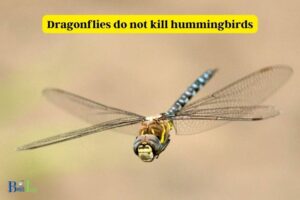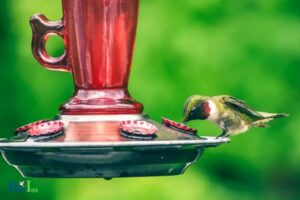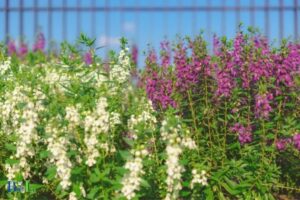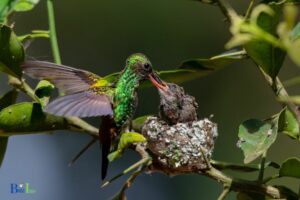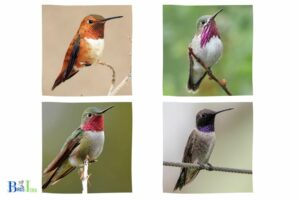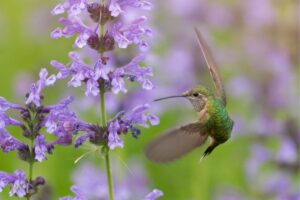Is Sugar Water Good For Hummingbirds? YES!
Yes, sugar water is good for hummingbirds. Sugar water is an easy and inexpensive way to feed and attract hummingbirds.
It is a nutrient-poor food source for hummingbirds, but it provides essential energy for the birds during migration and the breeding season.

Sugar water should not be the sole source of nutrition for hummingbirds, as it does not contain the nutrients they need such as proteins and minerals.
However, it is an important and easy way to provide energy to the birds when they need it, such as during migration or during times when nectar-producing plants are not in season.
DID YOU KNOW
Over 90 percent of hummingbirds feed primarily on sugar water, supplemented by small amounts of insects.
Why Sugar Water Is Good For Hummingbirds
Sugar water is a popular choice of food for many hummingbirds, as it provides them with the necessary energy to power their active lifestyles.
The main benefit of sugar water is that it contains a high percentage of carbohydrates, which hummingbirds need to have plenty of in order to maintain their energy levels.

Additionally, the sugar water provides hummingbirds with essential nutrients such as potassium and magnesium, which help to keep their bodies strong and healthy.
The sweet taste of sugar water also helps to attract hummingbirds and makes it easier for them to find food.
Furthermore, the water helps to keep hummingbirds hydrated and gives them the necessary liquid they need to stay alive.
In summary, sugar water is a great choice of food for hummingbirds because it is high in carbohydrates, provides essential nutrients, and has a sweet taste that helps to attract them.
Furthermore, it helps to keep them hydrated and provides them with the necessary energy to power their active lifestyles.
How To Make Homemade Sugar Water For Hummingbirds
Making sugar water for hummingbirds at home is an easy way to attract them to your backyard or garden.

All you need is sugar, water, and a feeder to provide a tasty treat for these beautiful birds.
Here are the steps to make homemade sugar water for hummingbirds:
It is important to remember to check the feeder regularly and refill it with fresh sugar water as needed. After a few days, you may start to see hummingbirds visiting your feeder to enjoy a sweet treat.
It’s important to remember that sugar water is not a substitute for a bird’s other needs which can only be met by natural sources of food.
birdsidea
How Much Sugar Water Should You Offer?
When offering sugar water to a hummingbird, it is important to make sure that the right ratio is used.
Generally, you should use a solution of four parts water to one part sugar, which is a ratio of 4:1. This means that for every four parts of water, there should be one part of sugar.

To make this solution, you should boil the water and then add one part of the sugar to the boiling water.
Stir the mixture until the sugar is dissolved and then let it cool before offering it to the hummingbird. It is important to never use honey or artificial sweeteners, as this can be harmful to hummingbirds.
Additionally, it is important to remember to change out the sugar water every couple of days. This keeps the sugar water fresh and helps to prevent the growth of harmful bacteria.
For example, if you have eight ounces of water, you would need two ounces of sugar to make the correct 4:1 ratio for the sugar-water solution.
What Nutrients Does Sugar Water Provide For Hummingbirds?

For example, a hummingbird may sip sugar water during the day to get energy and then feed on nectar and insects at night to get all the necessary vitamins and minerals.
Overall, sugar water is an important food source for hummingbirds, providing them with essential nutrients and energy to remain healthy and active.
What Are The Benefits of Providing Sugar Water For Hummingbirds?
Providing sugar water for hummingbirds is a great way to help these beautiful creatures in the wild. There are numerous benefits to providing sugar water for hummingbirds, including:

Providing sugar water for hummingbirds is a great way to provide a food source for these beautiful creatures and help them stay healthy.
With just a few simple ingredients, you can create a sugar water solution that will attract more hummingbirds to your yard or garden and provide them with the nutrition they need to stay healthy and energetic.
What Makes Sugar Water A Poor Source of Nutrition For Hummingbirds?
Sugar water is a poor source of nutrition for hummingbirds because it does not provide the necessary nutrients a hummingbird needs to stay healthy.
Hummingbirds require a diet primarily of nectar from flowers which provides them with proteins, fats, vitamins, and minerals.
Sugar water does not contain these important nutrients and hummingbirds can suffer from malnutrition if their diet consists mostly of sugar water.

Some of the specific reasons why sugar water is a poor source of nutrition for hummingbirds include:
- It does not provide essential proteins, fats, and minerals hummingbirds need to stay healthy.
- It can cause an imbalance of electrolytes in the hummingbird’s body, leading to dehydration.
- It can lead to a condition called “sugar shock” where the hummingbird can go into a state of shock due to its lack of essential nutrition.
- It can lead to serious health problems if consumed in large quantities, such as kidney and liver damage.
- It can cause a hummingbird’s life span to shorten due to its lack of essential nutrients.
In conclusion, sugar water is a poor source of nutrition for hummingbirds because it does not provide the nutrients they need to stay healthy and may lead to serious health problems if consumed in large amounts.
Therefore, hummingbirds should be provided with a diet that consists primarily of nectar from flowers in order to ensure they receive the proper nutrition for optimal health.
Are There Any Alternatives to Sugar Water For Hummingbirds?
Yes, there are alternatives to sugar water for hummingbirds. These alternatives include the following:

Flower Nectar:
One of the most natural alternatives to sugar water for hummingbirds is flower nectar. Flower nectar is the natural food source of hummingbirds and is available in a variety of different flowers.
Many backyard gardeners create hummingbird-friendly gardens by planting a variety of flowers to provide nectar for these birds.
Fruit Juice:
Another alternative to sugar water for hummingbirds is fruit juice. By diluting fruit juice with water, it can be used as a substitute for sugar water.
Some people have found that adding a little bit of honey to the mix helps to sweeten up the juice even more.
Insects:
Because hummingbirds feed on insects, they can also be a great alternative to sugar water. Many insects can be offered to hummingbirds, such as ants, wasps, flies, and spiders.
Grit:
Grit is another alternative to sugar water for hummingbirds. Grit helps hummingbirds digest their food and is made up of minerals such as calcium and iron.
Ultimately, there are many alternatives to sugar water for hummingbirds, providing these birds with a variety of food sources.
By providing these birds with their natural food sources, such as flower nectar, fruit juice, insects, and grit, backyard gardeners can help create a healthier environment for hummingbirds.
FAQ
Is sugar water beneficial for hummingbirds?
What is the best sugar-to-water ratio for sugar water to feed hummingbirds?
How often should the sugar water be replaced?
What can I add to the sugar water to make it more nutritious for the hummingbirds?
Is it safe for humans to drink sugar water?
Conclusion
Sugar water is an important, easy and inexpensive nutritious addition for hummingbirds. It provides an essential source of energy for birds during times of migration and breeding and should be used in addition to a variety of nectar-producing plants for their overall good health.

